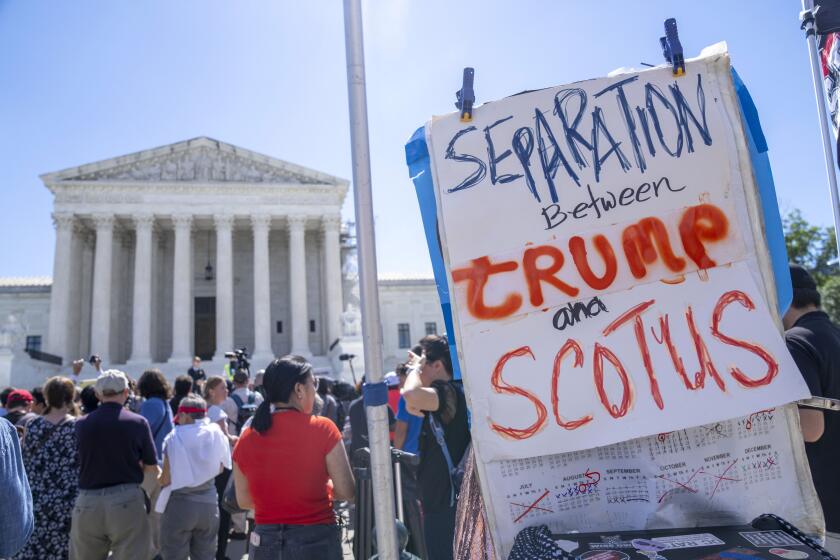PERSPECTIVE ON REPARATIONS : A Matter of Unfinished Business : America must own up to its responsibility to African-Americans, a people still ravaged by the effects of slavery.
Reparations, or compensation for injury and damages to a people or nation, is a well-established principle and practice in international law. After World War II, West Germany paid reparations to the Jewish victims of the Holocaust. Before German reunification, East Germany apologized to world Jewry and offered to pay $100 million to survivors of the Holocaust. The Soviet Union has officially acknowledged responsibility for the slaughter of 15,000 Polish citizens during World War II and pledged to pay reparations for war crimes.
In the United States, Congress voted to pay $20,000 to each Japanese-American who was unjustly interned during World War II.
One of the unresolved grievances that African-Americans have periodically raised with the U.S. government is the issue of reparations for injury and damage to Africans in America from slavery.
If there ever was a clear case for reparations, African-Americans have a legitimate claim. The African holocaust is the greatest holocaust in human history. Civil-rights leader and historian W.E.B. DuBois estimated that 100 million Africans were lost in the trans-Atlantic slave trade. In addition to the horrendous loss of life, Africans suffered enormous physical, mental and spiritual brutality under slavery. Africans were reduced to chattel by law, defined as three-fifths of a person in the Constitution and stripped of any “rights which the white man was bound to respect.” The family as an institution had no sanction in law and was disregarded at will by slave masters. As a result, black families were subjected to enormous strains.
Treated as virtual beasts of burden, African slaves provided the free labor that was the backbone of the Southern plantation economy. Free black labor was not only the base of the Southern economy; cheap Southern cotton and trafficking in slaves fueled the commercial and industrial development of New England, the Middle Atlantic states and ultimately the entire nation. Free black labor helped develop America, but slavery injured, damaged and underdeveloped African-Americans.
African-Americans have never fully recovered. Indeed, even when slaves were “emancipated,” the oppression of African-Americans continued through terror, lynching, segregation, discrimination, economic exploitation and disfranchisement. The slaves were “freed,” made citizens of the United States and hurled into a hostile, racist, capitalist society without land, capital or any meaningful form of compensation. A bill that would have fulfilled the promise of “40 acres and a mule” for the former slaves passed Congress, but was vetoed by President Andrew Johnson.
The matter of reparations is unfinished business that America must face. Historically, leaders from Frederick Douglass to Marcus Garvey, from Malcolm X to longtime African-American activist Queen Mother Moore have kept the issue of reparations alive among African-Americans. In recent years, the National Coalition of Blacks for Reparations has relentlessly pressed the case. Minister Louis Farrakhan, the Rev. Jesse Jackson, state Sen. Bill Owens of Massachusetts, Rep. John Conyers Jr. (D-Mich.) and other members of the Congressional Black Caucus are among those speaking out for reparations.
The granting of reparations to Japanese-Americans has spawned renewed hope that at long last the government will meet its moral obligation to address the claim of African-Americans. Encouraged by a growing groundswell of interest in the issue, Conyers has introduced a bill in the House that would create a federal commission to study the impact of slavery on African-Americans and the nation as a whole. Passage of the bill has become a focal point of mobilization and mass education for the reparations movement. Resolutions supporting reparations for African-Americans have been passed by the Detroit City Council and the Louisiana state Legislature.
Irrespective of the outcome of the bill, it is clear that reparations is emerging as a crucial issue for African-Americans in the ‘90s. There can be no final reconciliation between African-Americans and the U.S. government until our just claim to reparations is recognized and the appropriate compensation is made. Reparations in the form of cash, land, government securities, etc. could be placed in a national development fund to be used for the collective benefit of the national African-American community. America must own up to its responsibility to make a damaged people whole again.
More to Read
Start your day right
Sign up for Essential California for news, features and recommendations from the L.A. Times and beyond in your inbox six days a week.
You may occasionally receive promotional content from the Los Angeles Times.






